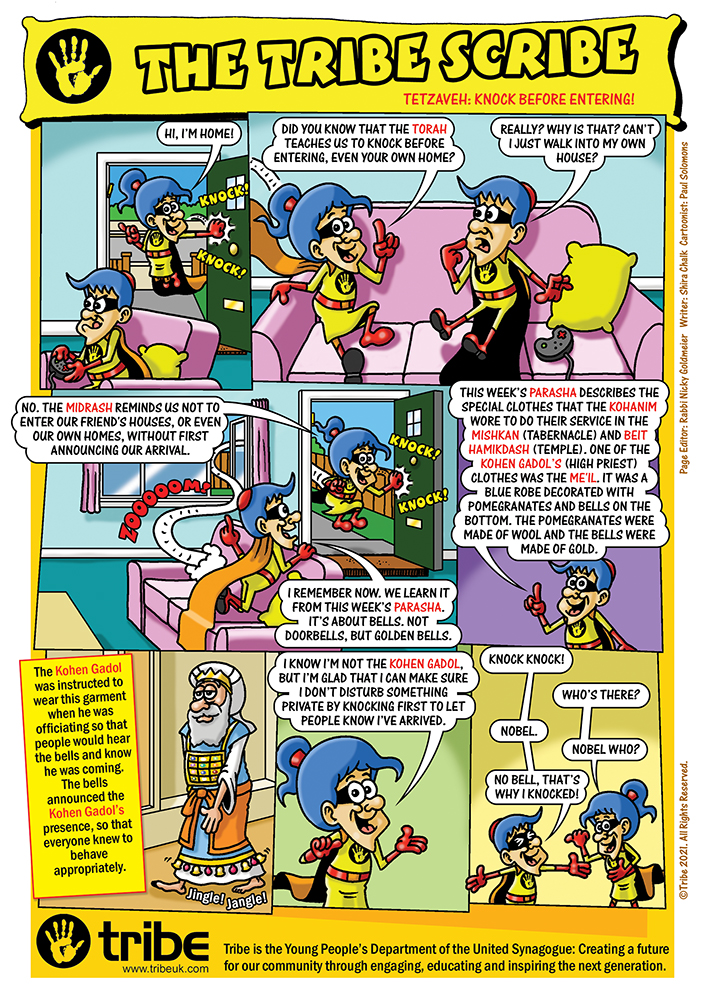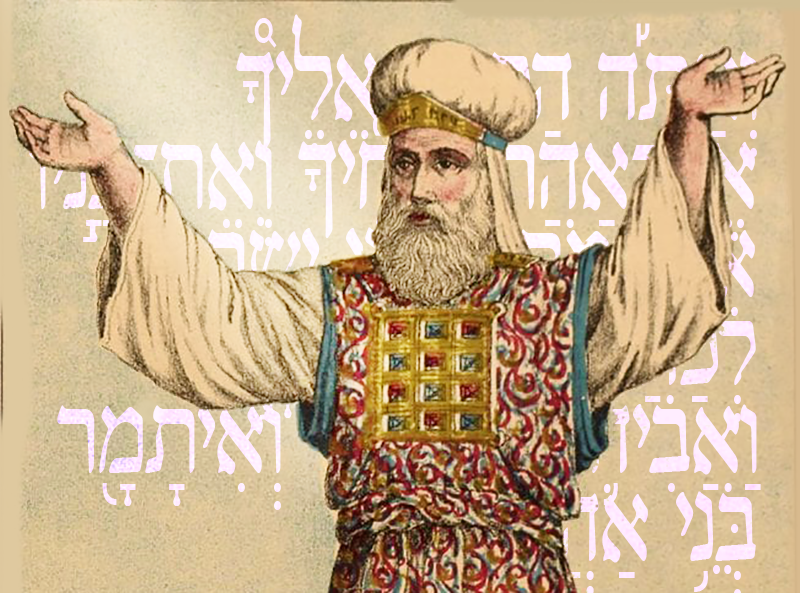Bonjour / Hello [nickname_else_first_name],
Table of contents
1) Perashat Hashavoua - Rabbi Eli Mansour
2) Halakhat Hashavoua (Halakhot related to day to day life) By Hazzan David Azerad - Halachot of Purim
3) Holy Jokes!
Parashat Zachor
On the Shabbat that precedes Purim, two Torah scrolls are taken from the ark; one for the regular parsha and one for the Maftir – ‘Remember what Amalek did to you’ (Devarim 25). Because of this reading, it is called, Shabbat Zachor (Remember). The Haftorah also deals with Amalek.
There is a mitzvah in the Torah to remember Amalek and his descendants and to orally recall their iniquity. We are to tell our children in each generation what the people of Amalek did to us during our departure from Egypt. This mitzvah will be fulfilled completely only when we shall have caused Amalek’s memory to perish, and their name to be erased from the world, together with the slightest remnant of anything that bears their name. As the Torah says: ‘Remember what Amalek did to you on the way, upon your departure from Egypt’… ‘You shall erase the memory of Amalek from beneath the heavens, you shall not forget.’ Upon which the Sages have expounded: ‘Remember,’ orally – ‘You shall not forget,’ in your heart.
ou.org
PURIM
Purim (/ˈpʊərɪm/; Hebrew: פּוּרִים  Pūrīm, lit. 'lots'; see Name below) is a Jewish holiday which commemorates the saving of the Jewish people from Haman, an official of the Achaemenid Empire who was planning to have all of Persia's Jewish subjects killed, as recounted in the Book of Esther (usually dated to the 5th century BCE).
Pūrīm, lit. 'lots'; see Name below) is a Jewish holiday which commemorates the saving of the Jewish people from Haman, an official of the Achaemenid Empire who was planning to have all of Persia's Jewish subjects killed, as recounted in the Book of Esther (usually dated to the 5th century BCE).
-Wikipedia

1)PERASHAT HASHAVOUA
This Week's Parasha Insight with Rabbi Eli Mansour
Purim and the Sale of Yosef
The Midrash (Ester Rabba 7:13) draws a connection between the Purim story and the story of Mechirat Yosef – the sale of Yosef as a slave by his brothers. After the brothers cast Yosef into a pit, the Torah relates (Bereshit 37:25), they sat down to eat a meal, and the Midrash comments that in response, Hashem announced, "You sold your brother amid eating and drink – so will I do to you!" This refers to Haman’s decree to annihilate the Jews, as immediately after issuing the decree, the Megilla tells, "The king and Haman sat down to drink" (3:15). Just as Yosef’s brothers condemned their brother to suffering and then sat down to eat and drink, so did Ahashverosh and Haman condemn the Jewish People to annihilation and then sit down to a feast.
The Midrash here teaches us that the root of Haman’s decree can be found in the story of Mechirat Yosef. Later commentators explain that the sale of Yosef introduced the ill of Sin’at Hinam – baseless hatred and strife among Jews – into the fabric of our nation, a "disease" that flares up, so-to-speak, when we fall into internecine fighting. Haman described the Jews of his time as "Mefuzar U’meforad" – "scattered and separated" (Ester 3:8), which, on one level, refers to their dispersion throughout the Persian Empire, but, in addition, denotes divisiveness. The Jews were divided into different factions and plagued by disunity, and this is what brought Haman’s decree. This is why Ester instructed Mordechai, "Lech Kenos Et Kol Ha’yehudim" – "Go assemble all the Jews" (4:16) and observe a three-day fast. The commentators explain that more important than the fast which the Jews observed was the "assembly," the effort to come together, to transcend differences, and join in peace and harmony.
This also explains why the salvation was brought about specifically by Mordechai, who, as the Megilla emphasizes, was an "Ish Yemini" – a member of the tribe of Binyamin (2:5). Binyamin was the only one of Yosef’s brothers who did not participate in Mechirat Yosef. Fittingly, this tribe was chosen to accomplish the "Tikkun" (rectification) of the Sin’at Hinam that plagued the Jews at that time and reawakened the nation’s guilt for what was done to Yosef.
The Sages allude to this association between the Purim story and the sale of Yosef also in a different context. In Masechet Megilla (16a-b), the Gemara discusses the gifts that Yosef gave his brothers when they returned to Egypt with Binyamin. Yosef gave each brother a change of clothing – but gave Binyamin five changes of clothing. The Gemara wonders how Yosef, who had suffered terribly on account of the favoritism that Yaakob had showed him, extending to him preferential treatment over his brothers, could have made the same mistake by showing favoritism to Binyamin. The answer, the Gemara explains, is that Yosef was alluding to his brothers that a descendant of Binyamin would one day wear five special garments. After Ahashverosh had Haman killed, he named Mordechai to Haman’s post, and Mordechai was dressed in five royal garments, bringing the Jews immense joy (Ester 8:15).
Why did Yosef see fit to make this allusion, and why was this done specifically through the extra garments?
I heard Hacham Baruch Ben-Haim (1921-2005) explain that Yosef gave Binyamin these extra garments as part of the "Tikkun" for his brothers’ sin. The ultimate repentance is achieved when one finds himself in the same position in which he had been when he acted wrongly, but this time refrains from sin. Yosef put his brothers in a position where they would be jealous of their younger brother – just as they had been twenty-two years earlier, when Yaakob favored Yosef, and they responded by selling him as a slave. This time, upon seeing the favoritism showed to Binyamin, the brothers did not react; they were not disturbed at all. This accomplished a "Tikkun" for their sin – thus paving the way for their descendants’ salvation during the time of Mordechai.
The Purim celebration revolves around the theme of unity and brotherhood. We enjoy festive meals with family and friends, exchange gifts, and give money to the poor so they would not feel envious or resentful. All this is part of the effort to cure the ill of Sin’at Hinam, to end fighting, conflicts and strife, and to build peace, harmony and unity among the Jewish Nation so we will be worthy of miracles and of our final redemption, Amen.
2) HALAKHAT HASHAVOUA
Halachot this week are selected and Translated by Hazzan David Azerad
The laws of Purim according to the rulings of Rabbi Obadiah Yosef ZT”L
When is the Megillah read or heard ?
A person must read or hear the Megillah once at night at the end of Ta’anit Esther and it can be read up to dawn and once again the following day during Purim .
During the day one may read the Megillah the entire day up to sunset.If he reads it after sunset he does not say the Berachot.
The one who reads the Megillah at night recites three Berachot .The first Al Mikra Megila,the second Sheasa Nisim La’avotenu and the third Shehecheyanu.The Following day we omit Shehecheyanu .
What if one speaks during the reading of Megillah and misses a few words?
The person reading the Megillah must announce publicly to the Kahal / congregation that it is important to listen to every word in order to fulfill the obligation of the mitzvah.According to many Poskim in Halacha if someone did miss a word he would have to listen to the Megillah again.
Everyone has the obligation to hear the Megillah men women and children who are at the age of understanding and will not disturb others from listening.
Bevirkat Shabbat Shalom Umevoravh
David Azerad
3) HOLY JoKeS!!
Selection of funny snippets, loosely related to this weeks parashah or current events, to brighten your day
Why is the Shabbos before Purim called Shabbos Zachor?
BECAUSE THAT IS THE LAST THING YOU WILL REMEMBER FOR A LONG TIME!
What was Queen Esther’s royal gown made of?
POLY-ESTER
Why do we give out so much tzedaka (charity) on Purim?
The Megillah says that this holiday is called Purim because of the PUR, the LOTS, that Haman drew. Therefore we give LOTS to the POOR!
What bracha (blessing) did the Jews say upon seeing Haman hanging on the gallows?
HA’EITZ!
(Haeitz literally means the tree. The blessing we say on fruits is “borei pri haeitz,” blessing G-d “who creates the fruit of the tree.”)
And one final oldie but goodie:
Who had the tallest family tree in history?
HAMAN!















